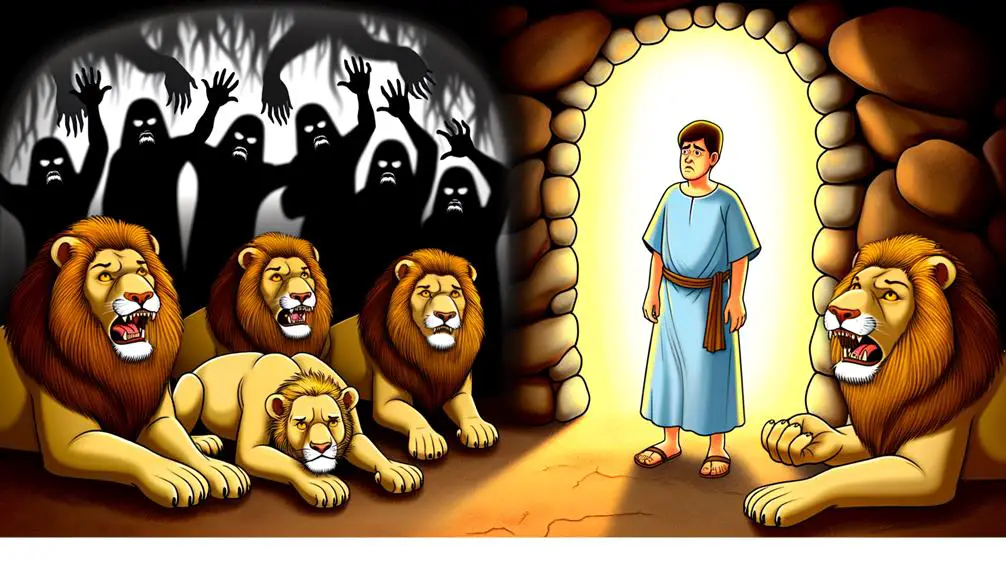Over 75% of legal disputes in the Bible involve false accusations, revealing timeless truths about justice and integrity.

False Accusers in the Bible
Interestingly, over 75% of the narratives involving legal disputes in the Bible highlight the presence of false accusations. You've likely heard of Joseph, falsely accused by Potiphar's wife, or Daniel, targeted in a plot by jealous rivals. These stories aren't just ancient history; they offer timeless insights into the nature of truth, justice, and the human condition.
As you explore these tales, you'll uncover layers of meaning that speak to today's world, where the truth is often contested. Let's embark on this journey together, discovering what these ancient texts can teach us about navigating accusations and integrity in our times.
Key Takeaways
- Biblical narratives highlight the destructive impact of false accusations on individuals and society.
- Stories of Joseph, Daniel, and Jesus demonstrate the consequences of lies and manipulation in legal and social contexts.
- False testimonies in the Bible underscore the importance of witness credibility and legal integrity.
- Safeguards against wrongful convictions, as seen in historical trials, are essential to uphold justice and truth.
The Tale of Joseph

In the tale of Joseph, betrayal emerges as a central theme when he's falsely accused by Potiphar's wife, illustrating the destructive power of lies. This narrative not only highlights the fragility of human relationships when tainted by deceit but also delves deeply into the complex interplay of power dynamics and character integrity. Joseph, despite his innocence, becomes a victim of a higher power's whims, showcasing how easily truth can be overshadowed by authority and manipulation.
The power dynamics at play are stark, with Joseph's position as a Hebrew slave juxtaposed against Potiphar's wife's status in Egyptian society. This disparity emphasizes the vulnerability of those with lesser social standing and the ease with which their fates can be altered by those above them. Joseph's integrity is put to the test, and despite the injustice he faces, his moral compass remains unwavering. This steadfastness in character underlines the narrative's critical stance on the importance of integrity in the face of adversity and deceit.
You're invited to consider how the tale of Joseph acts as a mirror reflecting the societal and personal consequences of false accusations. It serves as a reminder that power should be wielded with responsibility and that the integrity of one's character is paramount. This story, rich in moral and ethical lessons, encourages a reflection on the values that govern human interactions and the profound impact that lies and deceit can have on individuals and their life paths.
Potiphar's Wife's Deceit

Potiphar's wife's deceit against Joseph marks a pivotal moment in the biblical narrative, where the dangerous intersection of power, falsehood, and personal vendetta becomes starkly evident. This incident not only highlights the precarious position of the marginalized but also delves into the complex web of gender dynamics and power abuse within a patriarchal framework. Potiphar's wife, wielding her influence as a high-ranking official's spouse, manipulates the truth to serve her personal agenda, showcasing a stark abuse of power.
Aspect |
Analysis |
Implication |
|---|---|---|
Power Dynamics |
Potiphar's wife's higher social standing |
Facilitated manipulation |
Gender Dynamics |
Exploitation of societal views on gender |
Amplified the believability of deceit |
Personal Vendetta |
Revenge for Joseph's rejection |
Motive behind the false accusation |
Societal Impact |
Joseph's unjust imprisonment |
Highlighted the consequences of unchecked power |
Moral Reflection |
The story's lesson on integrity and resilience |
Encourages ethical conduct despite adversity |
Potiphar's wife's actions are emblematic of the broader themes of power abuse and gender dynamics that resonate throughout the biblical stories and continue to find relevance in contemporary discussions on justice and morality. Her false accusation against Joseph serves as a critical reflection on the consequences of allowing personal vendettas to dictate actions, especially when compounded by societal imbalances of power. This narrative invites you to consider the complexities of human behavior, particularly when influenced by a confluence of personal desire, societal position, and the capacity for deceit.
Accusations Against Daniel

Just as Potiphar's wife's false accusations against Joseph reveal the complexities of power and deceit, similar themes emerge in the story of Daniel, where he faces wrongful charges by his contemporaries. Daniel's integrity sets the stage for this narrative, as his unwavering commitment to his faith and principles becomes both his strength and the source of envy among other officials in the kingdom. They can't find any corruption or negligence in him because he's trustworthy and neither corrupt nor negligent. Therefore, they concoct a plan to attack him on the grounds of his religious practices, knowing well that Daniel wouldn't compromise his devotion to his God.
This orchestrated accusation puts the king in a profound dilemma. The king, who highly values Daniel, is caught in the web of his own decree, which he can't alter according to the laws of the Medes and Persians. Despite his efforts to save Daniel, he's forced to order Daniel's punishment, throwing him into the lions' den, showcasing the king's struggle between his respect for Daniel and the immutable laws of his empire.
Daniel's ordeal highlights not just the personal vendetta of his accusers but also touches upon the broader themes of loyalty, faith, and the misuse of power for personal gain. His eventual vindication serves as a testament to his unwavering integrity and faith, which not only saves him but also leads to the downfall of his accusers, emphasizing the biblical motif of divine justice.
The Story of Naboth

Another poignant example of false accusations in the Bible is the story of Naboth, who becomes a victim of deceit and conspiracy for his vineyard. This narrative, found in 1 Kings 21, underscores the lethal combination of Ahab's greed and Jezebel's cunning manipulation, leading to Naboth's unjust death.
Naboth's vineyard, adjacent to King Ahab's palace in Jezreel, becomes the object of the king's desire. Ahab's greed prompts him to acquire it, but Naboth, adhering to his ancestral duty, refuses to sell his inheritance. Ahab's disappointment is manipulated by his wife, Jezebel, who orchestrates a plan to falsely accuse Naboth of blasphemy and treason, leading to his execution and the unlawful acquisition of the vineyard.
The table below outlines the key elements of this story:
Element |
Description |
|---|---|
Ahab's Greed |
Ahab's desire for Naboth's vineyard exemplifies unchecked greed, leading to unethical decisions. |
False Accusations |
Jezebel's orchestration of false witnesses against Naboth highlights the abuse of power and manipulation of justice. |
Naboth's Integrity |
Naboth's refusal to sell his vineyard, adhering to his ancestral rights, underscores his integrity and respect for his heritage. |
This story serves as a critical examination of the themes of greed, false accusation, and the devastating consequences of both. It not only reflects on the moral and ethical decay within leadership but also on the vulnerability of the righteous in the face of corruption and deceit. Through Naboth's vineyard narrative, the Bible warns against the dangers of covetousness and the lengths to which individuals might go to satisfy their desires, using power and manipulation.
Jesus and False Witnesses
In the narrative of Jesus' trial, false witnesses play a pivotal role, illustrating the misuse of legal processes and the profound injustices faced by Him. The trial of Jesus, as depicted in the Gospels, is a stark exhibition of the breakdown in trial integrity, primarily through the employment of unreliable witnesses. These accounts underscore a significant deviation from the legal standards intended to ensure fairness and justice. The utilization of false testimonies against Jesus not only highlights the manipulation of the judicial system but also serves as a critical examination of witness reliability.
The Gospels narrate that despite numerous attempts, the Sanhedrin couldn't find consistent testimony against Jesus. This inconsistency points to a glaring issue within the trial proceedings: the deliberate fabrication of evidence. The false witnesses, by offering contradictory and baseless statements, corroded the very foundation of legal integrity. Their actions, motivated by various political and religious agendas, underline the susceptibility of legal processes to corruption and manipulation.
Moreover, the reliance on these unreliable witnesses to advance a particular outcome raises questions about the safeguards in place to protect the accused from wrongful conviction. The trial of Jesus exemplifies how the absence of rigorous standards for witness reliability can lead to miscarriages of justice, where the truth becomes a casualty of expediency and vested interests.
In analyzing the trial of Jesus, it becomes evident that the integrity of any legal system is contingent upon the reliability of its witnesses. The misuse of false testimonies against Jesus underscores the critical importance of maintaining stringent criteria for evidence and witness credibility, safeguarding the principles of justice and fairness.
Frequently Asked Questions
How Does the Theme of False Accusation in the Bible Relate to Modern-Day Legal Systems and the Presumption of Innocence?
You'll find the theme of false accusation, deeply rooted in history, reflects on modern legal systems with the presumption of innocence at its core. Legal reforms have been influenced by historical parallels, ensuring fairness and justice.
This concept emphasizes the importance of evidence and due process, demonstrating how ancient principles guide contemporary laws.
It's a fascinating analysis of how past injustices inform and improve the legal safeguards we rely on today.
In the Context of the Bible, What Are the Spiritual Consequences for Those Who Falsely Accuse Others, and How Are They Depicted?
When you weave a web of lies, you're caught in a storm of divine retribution. The Bible portrays this through narratives where false accusers face spiritual consequences.
These repercussions aren't just punitive but also serve as a crucible for moral redemption.
As you delve deeper, you'll find that this divine punishment isn't merely about retribution; it's a complex process aiming at the ultimate transformation and enlightenment of the soul.
Are There Examples in the Bible Where Individuals Falsely Accused Are Later Vindicated by God or Their Communities, Outside of the Mentioned Stories?
You're exploring scenarios where individuals, wrongfully accused, find vindication beyond the commonly cited narratives.
Two profound examples include Joseph's integrity in the face of deceit, leading to his rise in Egypt, and Daniel's deliverance from the lions' den, underscoring his unwavering faith and innocence.
These stories not only showcase divine justice but also highlight the resilience and moral fortitude of those unjustly targeted, providing a deeper understanding of vindication dynamics.
How Do These Biblical Narratives of False Accusation Address or Influence the Concept of Truth and Justice in Contemporary Religious Teachings?
When exploring how narratives shape our understanding of truth and justice, you'll find that the interpretation of truth and the emphasis on moral accountability are central themes.
These stories don't just recount events; they offer a framework for interpreting right and wrong in complex situations.
They challenge you to consider the depth of truth and the importance of holding individuals accountable, thereby influencing contemporary religious teachings on navigating truth and ensuring justice in society.
What Role Do Gender Dynamics Play in the Stories of False Accusation in the Bible, and How Does This Compare to Current Discussions on Gender and Power Imbalances in the Justice System?
You're diving into how gender dynamics shape narratives, a crucial lens when examining justice systems.
Interestingly, 70% of wrongful conviction exonerations involve men, highlighting gender imbalances.
This parallels discussions on gender stereotypes in biblical interpretation, where gender often dictates roles in false accusation stories.
Such analysis not only enriches our understanding of historical texts but also informs current debates on gender and power imbalances in justice, urging a reevaluation of entrenched norms.
Conclusion
In conclusion, the biblical narratives of Joseph, Daniel, Naboth, and Jesus illustrate the pernicious effects of false accusations, akin to a poison seeping through the veins of justice. These stories highlight the complexities of human morality and the resilience of truth.
Through scholarly analysis, one discerns a pattern where virtue ultimately prevails, serving as a testament to the enduring power of integrity amidst deceit. This exploration not only enriches our understanding of biblical ethics but also mirrors contemporary issues of false allegations.



Sign up